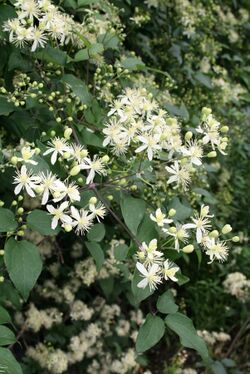Biology:Clematis gouriana
| Clematis gouriana | |
|---|---|

| |
| Scientific classification | |
| Kingdom: | Plantae |
| Clade: | Tracheophytes |
| Clade: | Angiosperms |
| Clade: | Eudicots |
| Order: | Ranunculales |
| Family: | Ranunculaceae |
| Genus: | Clematis |
| Species: | C. gouriana
|
| Binomial name | |
| Clematis gouriana Roxb. ex DC.
| |
Clematis gouriana, or Indian Traveller's Joy,[1] is a liana found in Asia which belongs to the buttercup family (Ranunculaceae).[2] It was described by Roxb. ex DC. and published in Regni Vegetabilis Systema Naturale 1: 138-139, in 1818.[3]
Distribution
The creeper occurs in the Himalayas from Pakistan , India , eastward through Nepal, Bhutan, Bangladesh and into western and southern China .[4][5] The hilly districts of the Western Ghats, the eastern part of the India subcontinent, and Sri Lanka.[1][5] In India, the creeper occurs in the states of Himachal Pradesh, Punjab, Haryana, Uttar Pradesh, Bihar, Orissa, Madhya Pradesh, Andhra Pradesh, Maharashtra, Karnataka, Kerala, Tamil Nadu, West Bengal, Sikkim, Assam, Meghalaya, Arunachal Pradesh, Nagaland, Manipur and Tripura.[5] The creeper is common in the Western Ghats, and the patches of adjoining forest of the Konkan coast and the Deccan plateau.[2]
Description
A large climbing shrub, reaching up to the canopies of trees. Glabrous, except for the younger parts of the plant. Grooved stem and branches. Leaves are pinnate, sometimes bi-pinnate or tri-pinnate. Leaflets may be ovate or oblong acuminate, with nerves and reticulate venation, and have a shining surface. Small flowers in many branched pannicles. Each flower is 1 to 1.5 inches wide, fragrant and greenish-white. Petals are absent but four greenish sepals present which are oblong-ovate and covered with soft down. Many stamens, with free, narrow and straight filaments which thicken towards the top. Compressed achenes, narrowly ovoid or oblong, with persistent feathery style.[1][2][6][7][8]
Natural history
C. gouriana is a vigorous climber spreading on thickets and climbing on trees. Principally in tropical and subtropical forests.[5] It occurs up to 5,000 feet (1,500 m) in the Himalayas; in the hilly districts of the peninsula it occurs between 1,000 feet (300 m) and 3,000 feet (910 m).[9] Flowering takes place from August to February, while fruits appear from September to May.[5]
Medicinal uses
C. gouriana is recognised as a medicinal herb in traditional medicine and amongst tribal communities. It has been investigated for its medicinal properties.[10]
The bruised leaves and stem act as a vesicant and are poisonous.[11] In Ayurveda, the leaves of the plant have been used for treating puerperal fever and bruises.[12] Leaf paste is applied to wounds of cattle by Jatapu, Khond and Savara tribals of Andhra Pradesh, India.[5]
In culture
In Himachal Pradesh, the plant is called Takri: 𑚏𑚮𑚠𑚖𑚱 ISO: cibaḍū or Takri: 𑚏𑚮𑚠𑚤𑚱 ISO: cibarū. [13]
References
- ↑ 1.0 1.1 1.2 W A Talbot (1902). The Trees, Shrubs and Wood-Climbers of the Bombay Presidency (2 ed.). Bombay: Government Central Press. p. 2. https://archive.org/stream/treesshrubswoody1902talb#page/2/mode/2up. Retrieved 24 March 2018.
- ↑ 2.0 2.1 2.2 P. Setu Madhava Rao, ed (January 1961). Maharashtra State Gazetteer, Botany, Part III - Miscellaneous Plants. General Series Volume A (2 ed.). Mumbai: Maharastra State. p. 522.
- ↑ "Clematis gouriana Roxb. ex DC.". http://www.theplantlist.org/tpl/record/kew-2726069. Retrieved 3 June 2016.
- ↑ Toomey, Mary; Leeds, Everett (2001). An Illustrated Encyclopedia of Clematis. Portland, Oregon, USA: British Clematis Society. p. 206.
- ↑ 5.0 5.1 5.2 5.3 5.4 5.5 "11. Clematis gouriana". eFlora of India. Botanical Survey of India. http://efloraindia.nic.in/efloraindia/taxonList.action?id=2109&type=4. Retrieved 24 March 2018.
- ↑ Talbot, WA; Gibson, Alexander (1861). The Bombay Flora (2 ed.). Bombay: Education Society Press. p. 1. https://archive.org/stream/in.ernet.dli.2015.221124/2015.221124.The-Bombay#page/n5/mode/2up. Retrieved 24 March 2018.
- ↑ Sardesai, Milind; Govekar, Ravikiran; Yadav, SR (2013). Field Guide to the Plants of Sahyadri and Konkan. Pune: Forest Department, Government of Maharashtra. p. 138.
- ↑ Shrikant Ingalhallikar (November 2001). Flowers of Sahyadri. Pune: S. Ingalhallikar. p. 98.
- ↑ Vardhana, Rashtra (2006-09-15). Floristic Plants of the World. Sarup & Sons. p. 206. ISBN 978-81-7625-651-3. https://books.google.com/books?id=hH4AFtTzL9AC&pg=PA206. Retrieved 24 March 2018.
- ↑ Rana, Shalika; Rawat, Kiran; Mahendru, Madhavi; Padwad, Yogendra; Pakade, Yogesh B.; Lal, Brij; Bhushan, Shashi (2015). "Screening of bioconstituents and in vitro cytotoxicity of Clematis gouriana leaves". Natural Product Research 29 (23): 2242–2246. doi:10.1080/14786419.2014.1000891. PMID 25587822.
- ↑ C.P. Khare (2008-04-22). Indian Medicinal Plants: An Illustrated Dictionary. Springer Science & Business Media. p. 158. ISBN 978-0-387-70637-5. https://books.google.com/books?id=gMwLwbUwtfkC. Retrieved 24 March 2018.
- ↑ "Clematis gouriana**". Ayurvedic Medicinal Plants of Sri Lanka. Barberyn Ayurvedic Resorts and University of Ruhuna, Sri Lanka. http://www.instituteofayurveda.org/plants/plants_detail.php?i=1092. Retrieved 24 March 2018.
- ↑ Pahari Hindi Shabdkosh. HPAACL.
External links
Wikidata ☰ Q6577866 entry
 |







